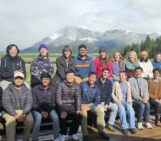
You’ve just finished your PhD or postdoc… now what? Perhaps you’re thinking of a non-academic career, but don’t know where to start, or which skills you need? Up to 70% of scientists move into non-academic careers after graduation (The Royal Society, 2010). But finding useful information and advice is hard. In today’s blog, we summarise the EGU Webinar ‘Careers outside of academia’ which took place on June 24th 2020.
A working group for careers, jobs and funding has been set up by EGU, with the aim of supporting the career development of its members, especially Early Career Scientists (ECS). Studies show that less than 1% of PhD students become professors/senior lecturers, and only 30% stay in academic roles after their graduation (The Royal Society, 2010). With this in mind, the working group has started to focus on providing information about non-academic careers, through a series of webinars and blog posts.
The first webinar was a broad introduction to careers outside of academia, accessible and of interest for all science divisions (over 300 people watched the live webinar). The panel of four members was composed of scientists with backgrounds in cryosphere, atmosphere, oceanography and volcanology, who now have careers in journalism, data analysis and management, teaching and process architecture (improving processes and streamlining projects).
Here, we will summarize the main take-away messages of this webinar.
Transferable Skills
The buzzwords ‘transferable skills’ are often used when looking for jobs online, but it can be hard to identify what yours are when you describe yourself solely as “a researcher”. During your academic career, you will have developed important communication skills through explaining your findings (to your parents, supervisor, defense or viva panel, in outreach, for a blog). These key skills are highly sought after in any job, regardless of the field. Project management, problem solving and multitasking, which you also develop through your PhD/Postdoc(s) research, are also sought after by the non-academic sectors. Developing skills such as programming, coding and software development, is important for job roles which include data management, modelling and risk calculation.
Work-Life Balance
One common theme throughout the discussion was work-life balance and reasons for moving to non-academic careers. For a number of panellists, addressing their poor work-life balance was what prompted them to leave academia (wanting to be close to or starting a family, working too many hours, having imposter syndrome, wanting to settle down somewhere). If you are interested in a more regular-timed (e.g 9am to 5pm) job, working in industry or teaching are good options. If you want to determine your own work and holiday schedule, then journalism and science communication may be for you.

“My transferable skills include drinking large amounts of coffee and procrastinating with cat videos”. Figure credit: Christina at Wocintechchat from unsplash
Finding and applying for jobs
Applying to jobs in academia can be a long process and often there aren’t many jobs in your field. On the contrary, there are a lot of non-academic jobs, often advertised on multiple platforms (e.g LinkedIn, email lists, recruitment websites), which can become quite overwhelming. Filtering options by what matters to you, be it location or particular type of job, will help you to find a role that you are interested in and therefore more likely to stay in. Application processes are typically more streamlined and faster in industry, as there are clear deadlines and numerous people checking the application forms. If you want to work for a specific company, or they aren’t hiring currently, then ask if you can leave your CV with them. For freelancing roles such as journalism or consultancy, persistence is key. Make sure to send your CV to multiple editors or businesses and don’t be put off if they don’t email you back immediately.
Challenges
One of the biggest challenges can be making the decision to leave academia. The advice from our panel members? Just go for it! You don’t have to stay in one job forever and you can go back into academia if you think you are more suited there. Social media platforms, such as twitter, will allow you to maintain your networks and academic relationships and keep you in the loop in your science field while you decide for yourself. Another challenge is getting used to not having a supervisor anymore! You become your own boss and have to own that you are bringing new skills to a team of people. If you are used to the more flexible working hours in academia, the early morning starts with a more structured job can be challenging to start off with. Don’t hit the snooze button!
Is there an overlap between academic and non-academic roles?
Yes! There are still many aspects of non-academic roles which are similar to research. Conference attendance and presenting your work remain an important part of your job in development, journalism, non-academic research and industry. In some cases, you are still able to work as a researcher alongside your job (see e.g. the Researchers in Schools programme). Publishing papers, reports, blog posts, press releases and GitHub updates are all still possible outside of academia.
Final tips
Don’t be afraid to try it! There is always the option to go back into academia – it isn’t a linear process. Decide what aspect of your PhD or academic role you really like. Maybe it’s science communication, teaching, data management or organising events? There are many opportunities to do this outside of academia too. Be persistent when applying for jobs or trying to find your footing in your new career. And don’t be afraid to talk about this with professionals in the field that interests you (e.g. through the MeetUp platform).
With huge thanks to the panellists: Dr Ashleigh Massam, Dr Robin Andrews, Dr Carly Matis and Dr Liam Brannigan. The webinar will be archived on the EGU YouTube channel approximately a week after the webinar, so you can go back to it at any point for more information.
Further reading:
- The Royal Society, 2010. The scientific century, securing our future prosperity. RS policy document 02/10. ISBN: 978-0-85403-818-3. https://royalsociety.org/~/media/royal_society_content/policy/publications/2010/4294970126.pdf
Edited by Marie Cavitte
This blog post was written by the working group for careers and jobs at EGU. The working group consists of a number of Early Career Scientist (ECS) representatives from multiple divisions. The aim of the working group is to widen the opportunities for career development offered by EGU. For more information, contact ecs-cr@egu.eu.




